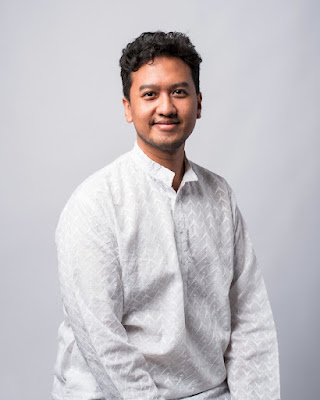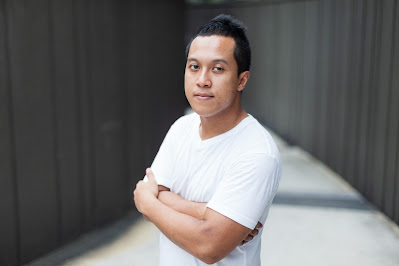A collection of interviews, photographs, essays and personal reflections, Khairat Kita is a project documenting the last few remaining Malay/Muslim Mutual Benefit Organisations (MMBOs) providing aid and charity to their deceased members' families. Known as badan khairat kematian, they are volunteer, community-led initiatives based on a centuries-old tradition of mutual aid.
Khairat kematian organisations are social anchors in the community and custodians of intangible cultural heritage in Singapore’s Malay/Muslim community.
With around 20 such organisations left, declining membership and ageing committee members, the future looks uncertain for these MMBOs.
 |
| Courtesy of Ethos Books |
About the Authors:
FAUZY ISMAIL researches Singapore’s architecture and urban heritage. He completed his masters in architecture at the National University of Singapore, investigating heritage and thirdspaces in architecture, and dealt with gazetted buildings as a government conservation architect. He was an artist-in- residence at The Substation from 2018 to 2019, and was also a fashion designer in Paris.
 |
| Fauzy Ismail. Courtesy of Ethos Books |
 |
| Zakaria Zainal. Courtesy of Ethos Books |
ZAKARIA ZAINAL is an author and photographer based in Singapore. He published Riot Recollections and The Invisible Force: Singapore Gurkhas with Ethos Books.
ZAKI JUMAHRI is an independent researcher and writer with a decade’s experience across the arts, cultural heritage, non-profit and legal sectors. His writings have been featured in Today and arts publications including Art & Market and Art Republik. His research interests include Jawi and Arabic manuscripts, Singapore history, and art and cultural heritage law.
________________________
ABB: What led the three of you to take up this project as co-authors?
FI: I was a researcher at the Singapore Heritage Society, where other researchers were looking into Chinese clans. I wanted to find out if there was something similar for the Malay community, and I realised that Malay/Muslim Mutual Benefit Organisations (MMBOs) were somewhat similar. There was also not much documentation on MMBOs. I had previously worked with Zakaria on creating images and narratives for a musollah project, and I enjoyed the process and outcome. Thus, I asked if he would like to work on this project. I asked Zaki along for the project as he is a research writer.
ZZ: Fauzy invited me to this project and it was my first time hearing of such organisations — which remain volunteer-led and committed to helping their members with their final rites. Reading the research and being present in many interviews with the MMBOS, I realised that their growth — as well as their decline — was a reflection of Singapore Malay/Muslim’s history and heritage.
ABB: Indeed, I’m glad you mentioned the importance of Malay Mutual Benefit Organisations (MMBOs), both historical and heritage wise for the Singapore Malay community. I was struck by how much social, cultural and spiritual life revolved around these organisations. How were they formed, and what roles did they play?
FI: MMBOs are formed during the kampong days to take care of funerary rites for the Malay/Muslim community. Due to the respect they garnered from the community, they also took on more roles over time to take care of the other needs of the Muslim community, such as religious classes, welfare, cultural activities, tuition classes, etc. As private companies, mosques and public agencies eventually filled these roles, MMBOs began to dwindle in number and influence. In addition, the lack of succession renewal contributed to their diminished status.
ABB: It’s a little unusual to have a book with three authors. How did you decide to apportion chapters or work in the project?
FI: We focused on our individual strengths and what we felt each of us could best bring to the table — whether it be our research skills, our interview skills, our documentation skills, crafting images, etc.
ZZ: The entire project had a research component, a documentary, a book and also social media content. There was a need to repurpose content to fit the audience that we were speaking to. All of us had an important role to flesh out each part in the best way possible.
ABB: What were some of the challenges you faced in writing the book, and were there any in terms of working together?
FI: The main challenge we faced during the project was working on it during COVID. We could not document the practices that MMBO used during the pre-covid time. COVID made it challenging to carry out documentation of MMBOs’ activities as they couldn’t run them. It was also difficult to meet and interview elderly leaders as they were much more vulnerable to the effects of COVID.
ZZ: Translating common themes and ideas from interviews and research material into easy-to-read narratives for the book was a challenge in itself. Some MMBOs had a richer connection to their past as compared to others, so that needed to be addressed more. Some had more to say about their future than others so we worked that in. There was also the challenge of translating (literally) their interviews from Malay to English, and also to include phrases we felt were important like silaturrahim (strong bonds between community, family) to preserve context.
ABB: What were some surprising findings you discovered in researching the book?
FI: That there is a rich history behind MMBOs, why they were established and why they were popular at one point in time. Also how little had been written on the subject and how there was very little existing contemporaneous documentation of their activities and influence. We had to pull from a diverse and sometimes surprising range of sources to try and piece together a more comprehensive history of MMBOs.
ABB: What has been the most rewarding aspect for each of you individually in terms of the project?
FI: After participating in an MMBO for all my life. I got a much deeper understanding of MMBOs in general, their achievements and also the challenges they faced in an urbanised society. Members took part in their activities because they saw themselves contributing to a broader, bigger cause than just themselves.
ZZ: I think the journey we shared with the MMBOs was deeply rewarding — especially how we were able to celebrate their work in both the documentary and the book.
ABB: How do you envision the topic of MMBOs adding to an important social conversation about neglected histories and aspects of Malay culture sidelined by dominant discourse?
FI: It’s a puzzle piece as part of compiling a broader historical picture of the cultural, social and political context of Malay/Muslim communities. We hope that other researchers and documentarians help to shed more light on MMBOs and other topics that may not have had the deserved limelight before.
ABB: Can MMBOs find new relevance going forward?
FI: MMBOs will continue to be relevant because people die all the time. However, they face challenges such as a need for leadership renewal with aging leadership and reduced interest from the younger generation. Functions done by MMBOs previously are being increasingly privatised and these new companies that deal with death represent competition and challenge that MMBOs face.
Thank you for coming on AsianBooksBlog.
__________________________
NB: Khairat Kita: A History of Malay/Muslim Mutual Aid in Singapore is published by Ethos Books, 2022, and available at local outlets at local prices.
